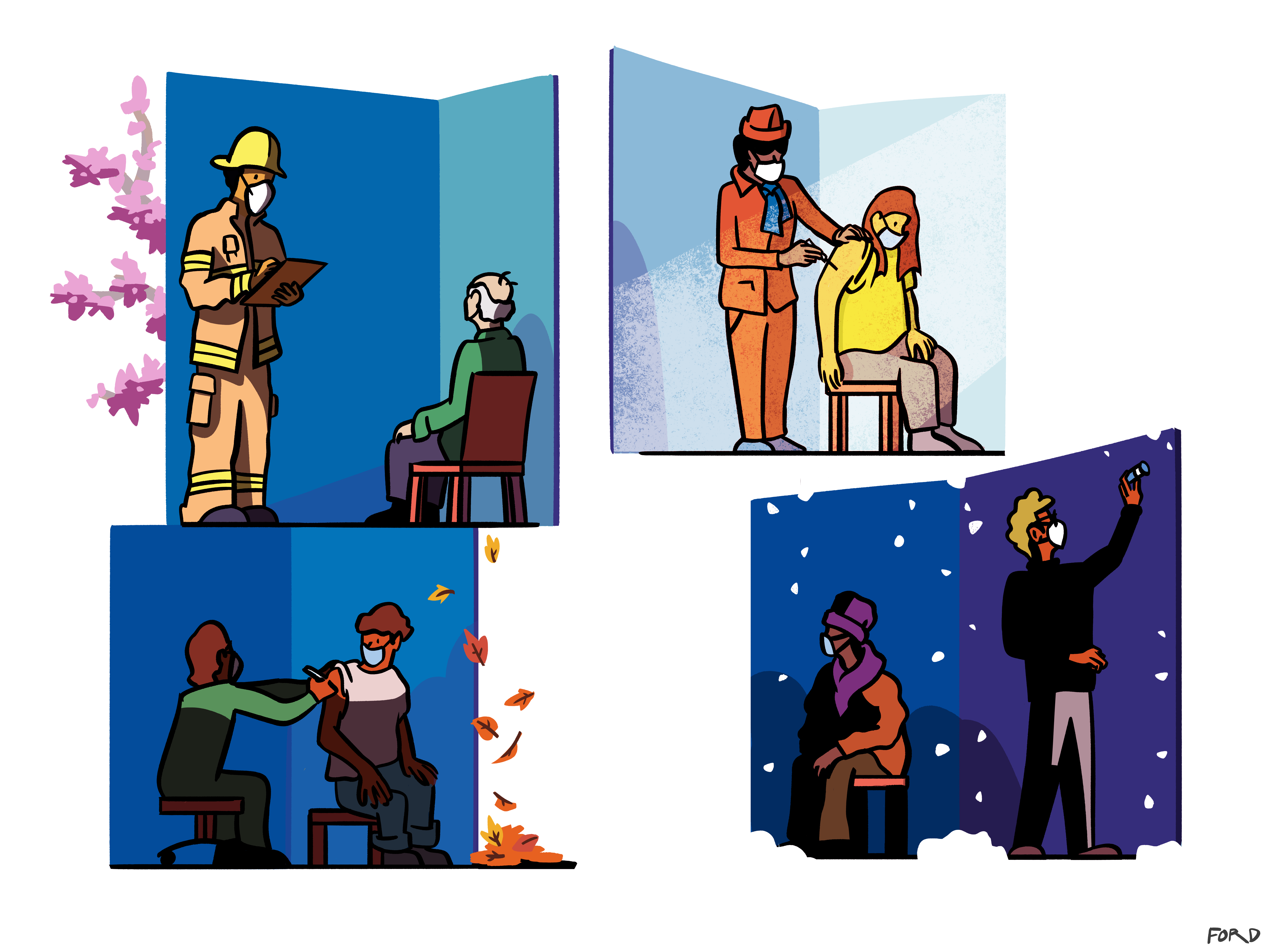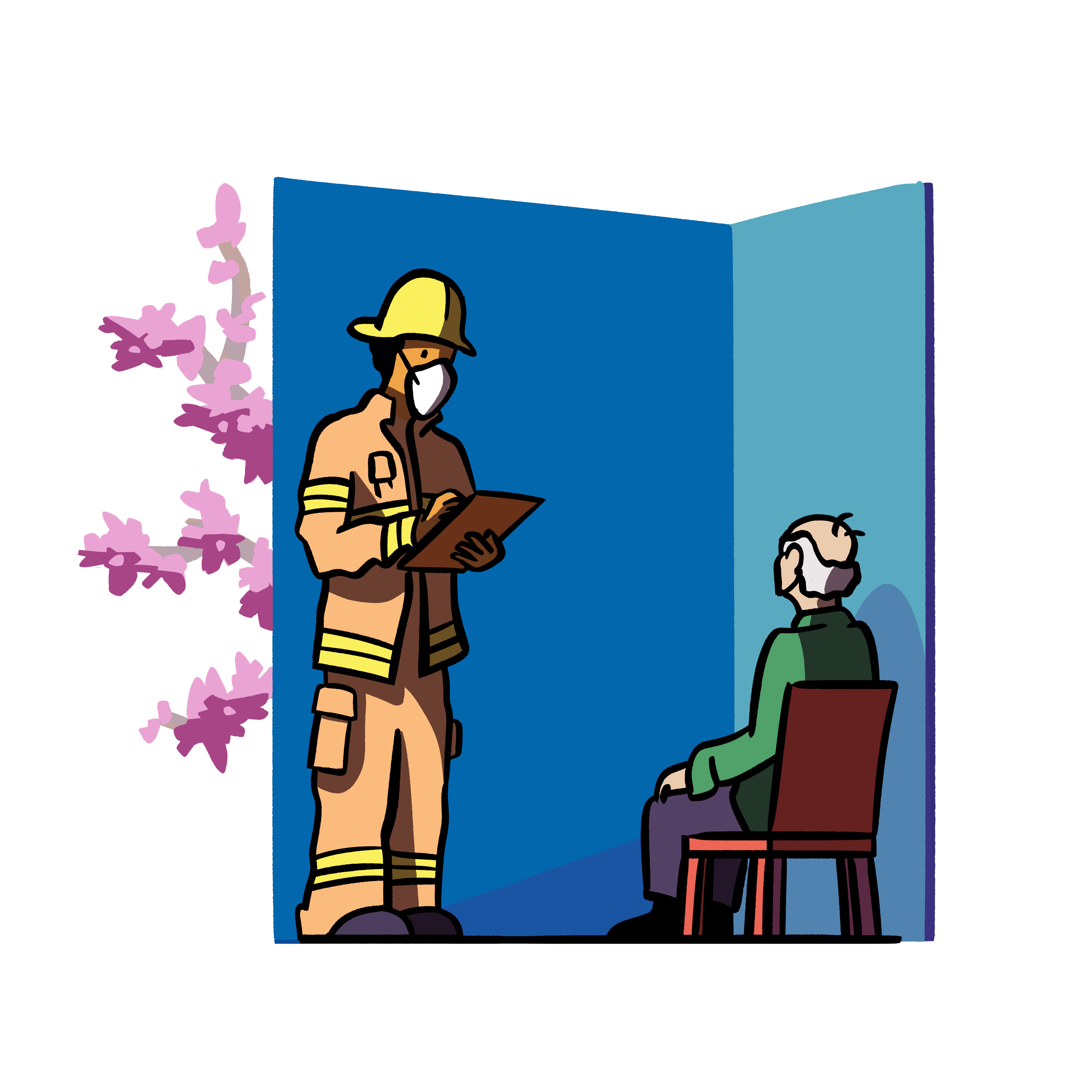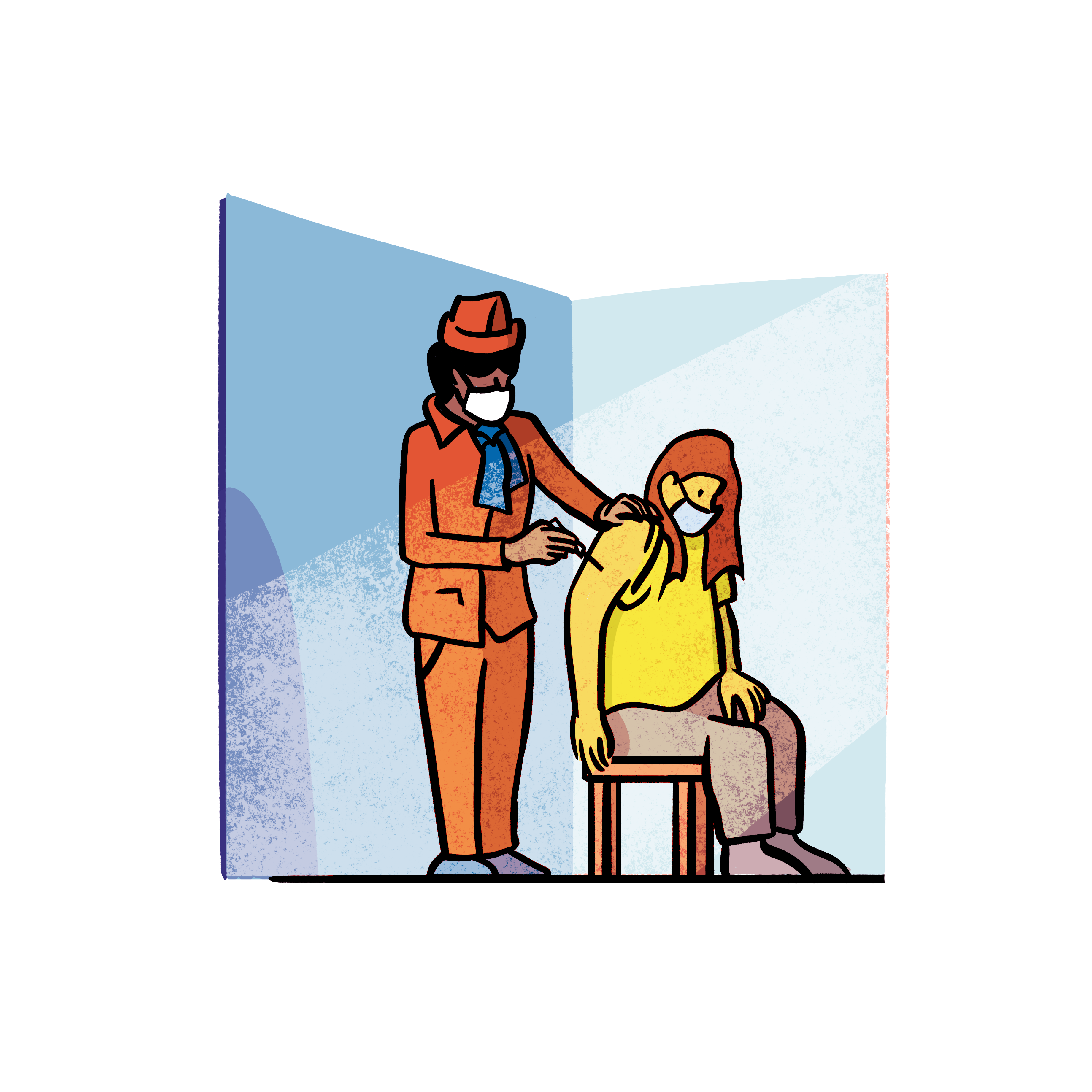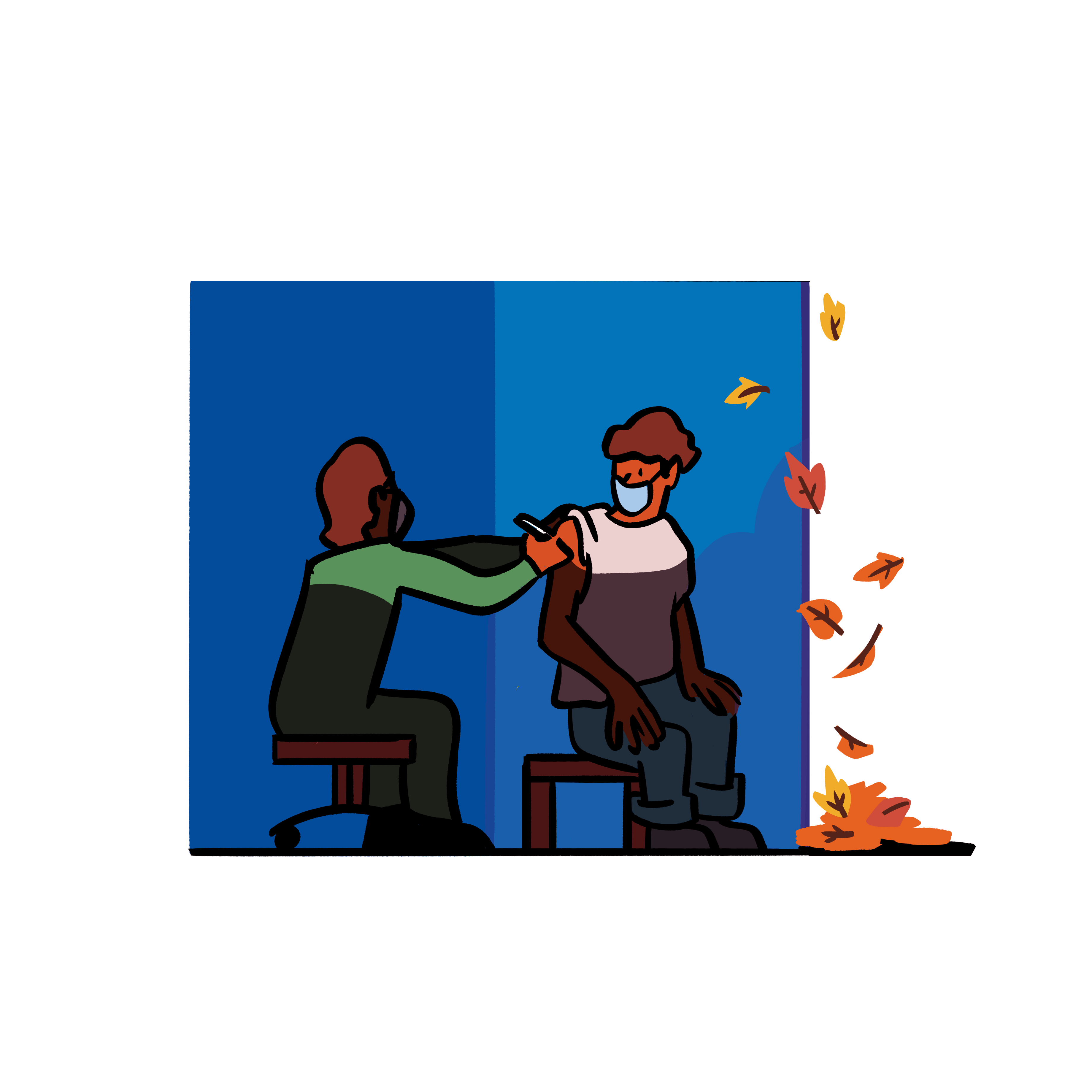A call to arms: My year of jabbing for the NHS
From the frail and elderly to school children, Michael Harrison spent the whole of 2021 on the frontline of the vaccine drive. This is a diary of what he saw


January 2021: “Have you ever had anaphylaxis?” “No, I’ve never even met her.” It’s my very first shift in a Covid-19 mass vaccination centre somewhere in England and I am listening to a sprightly but mischievous septuagenarian being health screened to establish he is suitable for the jab. It takes more than that to faze an ex-ward sister and so she presses on, asking him about any serious allergies, blood disorders or other medical conditions he has that we should know about. As I note down his answers and tick various boxes on my computer screen it occurs to me that after a lifetime spent mostly in newspaper offices, this is very different job.
I belong to an army of 80,000 volunteer vaccinators who have answered the call to arms though I don’t march under Boris Johnson’s banner and nor, I suspect, do many of my colleagues. Who are they? Many are retired health-care workers but these are outnumbered by vets, architects, ex-police officers, pub managers, beauty therapists, out-of-work actors and, most of all, airline staff – mainly cabin crew.
We have all completed our online training – including, bizarrely, one course teaching us how to spot and de-radicalise a would-be terrorist. And we have been taught the theory of how to vaccinate but very few of us have ever stuck a razor-sharp one-inch needle into human flesh until the first time we do it for real.
The mass vaccination centre I am working in is run by a stentorian phalanx of nurse managers – a fearsome bunch who brook no dissent from patients or staff. They run the place with brisk military efficiency, walking the floor from 8am to 8pm walkie-talkies in hand, cracking the whip and generally making sure everyone is in no doubt what the “mass” in “mass vaccination” means. I’d heard the PM saying he’s enlisted the army to help with the mass vaccination programme. Frankly, I cannot see what the military is going to bring to the party. I’d lay money on a nurse manager any day of the week in a fist-fight with a Regimental Sergeant Major.
I realise that this is how the NHS works and must work if it’s going to be equal to the enormous and daunting task before it. Command and control. Order and structure. Even so, after a lifetime spent in the chaotic and sometimes anarchic world of newspapers, it feels as if I have landed on an alien planet.
Day one passes in a blur. I’m out of bed at 6am to make sure I’m not late for my first shift. Bolting down breakfast before leaving home I catch the news headlines on Radio 4: in the US Phil Spector is dead from Covid and in the UK one patient is being admitted every 30 seconds to a Covid ward. My new boss (Sir Simon Stephens) says the NHS is facing the most perilous period in its history. The PM meanwhile has given a speech to a bunch of business leaders promising to turn Britain into the “Singapore of Europe”. Not sure I like the sound of that. Compulsory mask wearing 24 hours a day and prison for fibbing to Test and Trace? Surely that can’t be what he meant?
I’ve survived to day two and am booked to work an early shift again. Health Secretary Matt Hancock was on Radio 4 this morning sanctimoniously describing us as NHS heroes. But I don’t feel like a hero
I arrive at the centre by bike at 7.30am in plenty of time for the morning briefing. It’s cold and dark and miserable outside. Inside, it could be any time of night or day – or month, or season for that matter. The huge, windowless hall is illuminated by harsh fluorescent strip lighting and was designed for something much more pleasurable than the purpose for which it is being used today.
The briefing is brief. We are told how many patients to expect today (980) and reminded of the rules: arms bare below the elbow, no sneaking a look at our smart phones between patients, tea break to last no more than 15 minutes and all used needles in the sharps bin.
I am wearing my staff identity badge and a dark blue NHS polo shirt which identify me as a Covid Administrator. I had applied to be an Immuniser but I’m told the centre has more vaccinators than it can shake a stick at so, frustratingly, I’m restricted to clerical duties for now.
I’ve survived to day two and am booked to work an early shift again. Health Secretary Matt Hancock was on Radio 4 this morning sanctimoniously describing us as NHS heroes. But I don’t feel like a hero at all. I feel like a very small and insignificant cog in a very large machine. I am being tutored by another Covid Administrator, who has only recently joined herself. Until the pandemic struck, she was working in a travel agency. Not much call for travel agents these days.
The doors open at 8.30am and the day starts slowly (in all senses of the word). Most patients are elderly because the government has mandated that priority be given initially to the over-seventies, plus anyone extremely clinically vulnerable and front-line health, social and care-home workers: 15m people. Quite right when these groups currently account for nine in 10 deaths from Covid. The patients shuffle in, wrapped up like Michelin men against the cold. Many also have hearing difficulties, some are in wheelchairs or walkers and most of the men are wearing close-fitting, long-sleeved shirts. It takes an age to screen them and often longer to vaccinate as they mechanically strip off their winter layers and then slowly get dressed again.
The men struggle valiantly to roll sleeves up arms or off shoulders until they admit defeat and remove shirt entirely. The women seem able to slip their arm out of any top in one deft, economical movement. My wife tells me it is something to do with years of practice removing bra from body without taking off an outer garment.

On the plus side, these elderly customers are, almost without exception, polite, tremendously grateful and stoic. They don’t object to being processed. They don’t whine about spending up to an hour in the airport-style queue that snakes its way through the vaccination hall. They don’t mind that what awaits them is not a flight to the winter sun but a jab in the arm. They don’t flinch or cry out when the needle goes in. They stare straight ahead and think of England. More than anything, they are just happy to be here. It seems hard to credit but in lockdown Britain in February 2021, if you want social contact then pretty much the only two places you can go are the supermarket or the mass vaccination centre.
During my afternoon break I wander the wide corridors outside the vaccination hall, gazing at the billboards advertising upcoming acts and catch a few moments of Joe Biden being sworn in as 46th President. Trump has snubbed the inauguration and promised America he will be “coming back in some form”. Like a new mutation of the virus.
Back in the pod, an elderly Bulgarian couple have arrived for their jab. They have literally not a word of English and I marvel at how they got this far. Luckily, a translator is located. It is amazing what you can find when you have that many cabin crew in one place. Something else amazes me – the sheer range of substances and food stuffs that can provoke an allergic reaction. As the shift draws to a close a very smartly turned-out woman in an expensive two-piece enters our pod. She nervously confides that she’s allergic to caviar. There is, the nurse manager assures her, no sturgeon’s roe in this vaccine.
February
As a country, we have just laid claim to a terrible and unenviable record: the UK has become the first nation in Europe to record more than 100,000 Covid deaths. The big news in the centre, however, is that the head of operations has launched an “employee of the week” scheme. The prize will be a box of chocs or biscuits donated by a grateful member of the public (no expense spared in the NHS).
My news is that weeks of grovelling to the nurse managers and general sycophancy have paid off and I am graduating to the role of vaccinator. I will be trained on the job and signed off today.
I’ve conducted dummy vaccinations at home on my wife with one of those cake decorating pens that cooks use to apply letter icing and tested out my small talk. “Have you had to travel very far this morning?” “What are your plans for the rest of the day?” My wife says she’s heard better chat-up lines. I’ve watched hundreds of patients being jabbed but I’ve never stuck a real and extremely sharp one-inch needle into flesh until it meets either muscle or, very occasionally, bone. Will the patient flinch, or howl or spurt blood? Will I drop the needle? What if the needle breaks off in the patient’s arm?
Weeks of grovelling to the nurse managers and general sycophancy have paid off and I am graduating to the role of vaccinator. I will be trained on the job and signed off today
It is going to be a busy day – 2,600 patients are booked in which means there will be little or no respite. We will be jabbing at the rate of one patient every two minutes. No room for passengers. My very first patient is a woman who has thoughtfully dressed for the occasion in a loose-fitting short-sleeved blouse. By the time she sits in the chair she has already removed her cardigan to expose a plump but firm upper arm.
I decide not to confide that this is the first vaccination I have ever given or warn the patient that I’m about to stab her. I’ve often heard the vaccinator saying “sharp scratch!” just before the needle goes in. It probably beats, “just a tiny prick!” but I decide it’s best not to give any running commentary.
I locate the sweet spot in the middle of the deltoid muscle. The needle goes in smooth and clean, a knife through butter, I depress the plunger and the precious liquid gold – in this case 0.5 millilitres of AstraZeneca’s finest – disappears inside the arm. I’ve completely forgotten my patter but the patient seems happy enough and asks me whether I’ve given her the vaccination yet.
A few days later Boris Johnson announces his four-stage plan to get us out of lockdown with a typical rhetorical flourish. “The crocus of hope is poking through the frost and spring is on its way.”
I personally haven’t spotted many crocuses poking through the frost, hopefully or otherwise. What I have noticed is managers from pharmacy, infection control and staff deployment walking about with clipboards. There is a lot of that.
March
The armed forces have a mantra: “If it moves salute it, if it doesn’t, paint it.” In the centre we have adapted this to read: “If it moves jab it, if it doesn’t, wipe it.” Everything – hands, seats, tables, syringe trays, vaccine vials, computer keyboards, bins – is wiped. Religiously, constantly. The patients observe this. What they don’t see is the meticulous process that gets vaccine from cold store to needle – from farm to arm, so to speak. We take pride in getting one more dose out of each vial of vaccine than the manufacturer is being paid for. For every 10 patients jabbed that saves the NHS £3.50 in the case of Astra Zeneca but £22 with Pfizer and Moderna.
A man dressed in a boiler suit and what looks like a WW1 gas mask ... would like to remain socially distanced from his vaccinator. We explain that we don’t have a needle that long. Eventually he leaves unvaccinated
Photographing or filming of staff and patients is strictly forbidden (unless you happen to be a camera crew from the local television station which seems to materialise quite regularly to interview one of the big cheeses). Midway through an early shift a well-dressed couple walks into the pod. After the woman has been jabbed, she takes a seat opposite her husband while he bares his arm. She has her mobile phone balanced on her lap in a sideways position and is staring intently at him. There is something not quite right about this scene. After a few seconds, the penny drops: she is videoing him being vaccinated. The husband, a local businessman who runs his own software company, pleads that many of his staff are anxious about the vaccine and if they could just see the boss being jabbed it would put their minds at ease. His excuse is given short shrift. His partner is made to produce the phone and delete the offending video before being allowed to leave the pod.
Two days later a man dressed in a boiler suit and what looks like a WW1 gas mask arrives for his jab. He is also wearing surgical gloves and rubber boots. He says he has acute psoriasis and is extremely anxious and uncertain about being vaccinated. It is difficult to determine his age, but I suspect he has multiple other health issues which is why he’s been catapulted up the priority list. Eventually he consents to the jab on condition that no physical contact is made with him. Preferably, he would like to remain socially distanced from his vaccinator. We explain that we don’t have a needle that long. Eventually he leaves unvaccinated. I have no idea whether he ever returned.
April
More than 30 million people have been jabbed once and five million have now had their second dose. However, Astra Zeneca is no longer being given to anyone under the age of 50, unless they were given this vaccine for their first jab, because of fears that it may cause very rare but fatal blood clots. It doesn’t quite square with the government’s message that the vaccine is safe. Understandably, it has also led to some confusion among our older patients, who ask why something that might kill them is being injected into their body not once, but twice.
The change in policy has coincided with a sharp slowdown in availability of the Astra Zeneca vaccine. Something to do with problems at the Serum Institute in India, which has been providing much of our requirements.

As a result, appointments have shrunk to the low hundreds and the centre is massively overstaffed. We are given the option of undergoing refresher training (no thank you) or signing up to work alongside the roving teams, which are delivering vaccinations out in the community. I ask a colleague what her experience was of roving. She says the organisation is chaotic, no one has much idea of where they are going or in which order to jab patients. She ended the day in a care home many miles from the centre – a depressing place smelling of boiled cabbage and despair. The owners were not even certain how many residents were in the home and how many had been vaccinated.
I am aware that Covid-19 has put the sector under enormous strain and cut a cruel swathe of death through many care homes. But this is scandalous. Criminal almost.
May
The Delta (otherwise known as the Indian) variant is rampaging through the nation. This poses awkward questions for the PM as to why India wasn’t placed on the red list earlier. It also forces him to cut the wait time between first and second jabs from 12 to eight weeks. He assures the nation, however, that in the race with the virus, the vaccine is still ahead by a nose. He also sweeps the board at the local elections, as do the incumbent governments in Wales and Scotland. If there was ever a vaccine dividend, then this was it.
In the centre, we are jabbing at maximum capacity, the queues stretch out of the door and around the block. Everyone is under extraordinary pressure and mistakes can happen. Somehow two patients have been jabbed with empty, dirty needles at our sister sites. The political equivalent would be lying to Parliament. It must never happen. We are ordered to hold each syringe up to the light to make doubly sure it is loaded correctly. The nurse managers walk the floor monitoring us, eagle-eyed.
Somehow two patients have been jabbed with empty, dirty needles at our sister sites. The political equivalent would be lying to Parliament. It must never happen
As the month draws to a close, anyone over the age of 30 becomes eligible for the jab. We are seeing many more pregnant women. The JCVI says there is no evidence the vaccine is unsafe for them or their unborn child, but our screening nurses frequently find themselves locked in agonised, emotional discussions. The informal advice is often to suggest the patient waits until they have completed their first trimester. After a lengthy and agonised discussion with a nurse manager, it is not unusual for a pregnant woman to leave the centre unvaccinated.
June
We are now jabbing anyone over 25 and using Moderna vaccine, Astra Zeneca having been phased out because of the blood clotting risk. It’s summer so everyone is wearing T-shirts, which is a plus – fewer layers to remove and fewer patients with mobility issues. But with a younger cohort comes a whole new range of challenges. There are many more fainters – some days the observation area resembles a military field hospital. Many more patients have tattoos, which can act as a weird distraction when deciding where exactly to jab and, very often, the more hench the guy, the more he shrinks from the needle. There are also more allergies, more needle-phobia and, as the age range falls, sadly more obese patients.
Midway through a late shift, an elderly gentleman walks in, immaculately turned out in dogtooth check jacket, trilby and cravat. He is a former boxer and he gives his year of birth as 1935. I ask him why he is only coming in now when he should have been among our very first patients. He tells me he could not have his jab earlier because he was isolating at home with his 81-year-old immuno-suppressed wife. Somehow the roving vaccinators had missed them. Sadly, his wife had succumbed to Covid a fortnight earlier (no one knows for sure how she contracted the disease in isolation, perhaps it was brought into their flat by a care worker?) He has buried her and is now able to get his vaccination. He has his jab and makes a dignified exit from the pod, wiping a tear from his cheek. The rest of the pod is in tears too. This is a cruel virus, indeed.
Gina Coladangelo. I’m sure I’ve worked with her. With a name like that she’s got to have been cabin crew once upon a time
I arrive for an early shift one morning in late June and everyone in the briefing room is gazing at a grainy picture on the front page of The Sun. It depicts a couple in a steamy embrace with the man’s hand on the woman’s bottom. The air stewardess I’m on with today is much more interested in the woman than the man. “Gina Coladangelo. I’m sure I’ve worked with her,” she laughs. “With a name like that she’s got to have been cabin crew once upon a time.”
Two days later the man, our ultimate boss Matt Hancock, is obliged to resign for breaching social distancing rules. Two days after that the chief medical office Chris Whitty is filmed being assaulted by a drunken estate agent in a London park. It is safe to say with whom most of our sympathies lie.
July
Delta is spreading so fast and so many people are testing positive that we have a pingdemic on our hands. If we have the NHS Covid-19 app on our phones, we are told to switch it off or delete it. We cannot afford to have large numbers of vaccinators self-isolating, especially at a time when the bedrock of the workforce, our cabin crew, are beginning to drift back to their airline jobs. Long queues of hot and bothered patients are still forming outside but there is something more troubling at the door. An anti-vax protest is taking place. The crowd of 100 or so is being whipped into a state of furious indignation by a smartly dressed woman with a megaphone and an extraordinary lung capacity. She harangues her followers for three hours, forcing the centre to close temporarily, before the police finally usher her away. We are advised henceforth to remove our staff badges and uniforms before leaving the centre for fear of physical attack.

August
We are now offering the vaccine to all 16 and 17-year-olds. Some arrive in the company of a parent but many others look like 20-somethings. They are, however, still classed as minors for safeguarding purposes and so have to be jabbed in separate pods, away from adult patients. The pace of activity is more relaxed and the atmosphere in the pod is almost pastoral. I am working with a Band 6 cardiac nurse who gave up her posting in the spring, exhausted, demoralised and disillusioned. She says her former colleagues are leaving in droves too. She does not know how the cardiac unit will survive. She could be earning £25 an hour if she had opted to work in one of the GP-led vaccination sites, 50 per cent more than she gets here. She says she prefers the ethos of an NHS Trust centre. To her mind, the GP centres, like GP surgeries, are private money-making operations and it is hard to disagree. They receive £12.58 for every single jab they administer and are creaming it.
My first shift is going well until a syringe breaks apart as I inject a Year 9 pupil. This is not an isolated event. Our needles are cheap and poorly made
September
Jabbing five days a week in the centre is relentless and remorseless so for a bit of variety I’m joining the school immunisation team now that we are vaccinating 12- to 15-year-olds. My first shift is going well until a syringe breaks apart as I inject a Year 9 pupil. This is not an isolated event. Our needles are cheap and poorly made. My next patient arrives with his support worker. He is autistic and acutely anxious. I’m about to jab him when he suddenly rears from the syringe like a startled horse, the needle traces an arc across his arm and blood gushes everywhere. He is patched up and advised to try again the next day.
It has not been a great day at the office but what disturbs me more is what happens as we begin to pack away our equipment. We count that we have vaccinated 270 pupils but, somehow, we have 186 doses of Pfizer left over. They cannot be put back in the fridge nor can they be taken back to the centre and used. They must be disposed of. Pfizer costs £22 a shot. I do the maths and calculate that we are about to throw away more than £4,000 worth of vaccine. The nurse manager in charge confides that this is a regular occurrence. If this is happening in one school on one day in one part of the country then millions of pounds worth of vaccine must be going down the drain. It’s a great story. I can’t believe the local press has not cottoned on to it.
I’m back doing shifts in the centre and today is the deadline for care-home workers to get their first jab if they want to keep their jobs. We process and jab a steady stream of them, including a woman from Zambia who tells us matter-of-factly that she does not want to be vaccinated but one of her closest colleagues had died with Covid two days ago. Just one of the 142 souls to perish that day.
We process and jab a woman from Zambia who tells us matter-of-factly that she does not want to be vaccinated but one of her closest colleagues had died with Covid two days ago. Just one of the 142 souls to perish that day
October
The booster programme is in full swing but we have only just started giving them. The latest Bond No Time to Die has opened in the cinemas. As slogans go, I think it would make a good replacement for Hands, Face, Space. A Swedish expert has a better idea – pay everyone £17 if they get their booster jab.
It’s a slow burn at first with more walk-ins than booked appointments, which makes it difficult to predict demand. Waiting times can be as much as two hours, which translates to queues of angry, wet and disaffected patients. Plus, the oldies are turning up in their winter garb once more which means the return of the vaccinator’s nightmare: the long-sleeved, tight fitting tailored shirt.
Morale in the centre is dipping. Many of us are beginning to feel drained mentally, physically and emotionally after nine months of relentless jabbing. And we are short of staff as more and more cabin crew return to their day jobs. To revive our spirits, plans are announced for a Christmas party in a local hotel. A three-course meal and free bar for £40-a-head. It is dubbed the Vaccinators Ball but it could just as easily turn into a super-spreader event.
At the end of the month we throw away £10,000 worth of Moderna vaccine that has reached its expiry date.

November
The countdown to Christmas has begun and with it the piped festive music. The dulcet tones of Mariah Carey singing All I want for Christmas drift through the centre on the hour, every hour. You can set your watch to it.
As if this was not challenging enough, Omicron is upon us and the booster programme has been opened to everyone over 18. The new boss of NHS England Amanda Pritchard has called for another army of volunteers to step forward so that we can get the whole nation triple jabbed by the end of January 2021. She must know that it takes at least two months to train a vaccinator so quite where these shock troops are going to materialise from is anyone’s guess. The centre has neither the staff nor the capacity to meet demand. The PM promises that new vaccination sites will start popping up around the country like Christmas trees. Hopefully, they won’t be as ropey as the one the Norwegians have sent us this year. To incentivise GPs, they’ll be getting £15 for every patient jabbed – a 20 per cent increase. Strangely, our pay is not going up.
December
The virus is in danger of beating the vaccine at the eleventh hour, a bit like Sebastian Coe storming past his rivals down the home straight. Infections, hospital admissions and deaths are on the rise again. To combat the Omicron tidal wave heading our way, the booster programme is being supercharged. We are being asked to jab a million people a day so that everyone is boosted by New Year’s Eve. Where are those troop reinforcements? Or is the PM over-promising again and leaving us to under-deliver?

It is 31 December, my last day in the centre and my final day of jabbing. The PM announces that the target of “offering all eligible adults” a booster has been met. So that’s what the target was. In point of fact, only 75 per cent have been given a third jab.
I have lost count of the number of patients I have jabbed but it runs into many thousands. I have processed and screened thousands more. I have sat cheek by jowl with them for 12 months and, miraculously, I have managed to avoid catching the virus. I leave the centre for the last time, arrive home and take my usual lateral flow test before heading out for Hogmanay celebrations. I test positive.
The writer is a former Business Editor of The Independent and author of two true-life financial thrillers: Mr Charming: the Life and Crimes of Felix Vossen and Five Minutes to Midnight – How Britain Survived the 2008 Banking Crash




Join our commenting forum
Join thought-provoking conversations, follow other Independent readers and see their replies
Comments